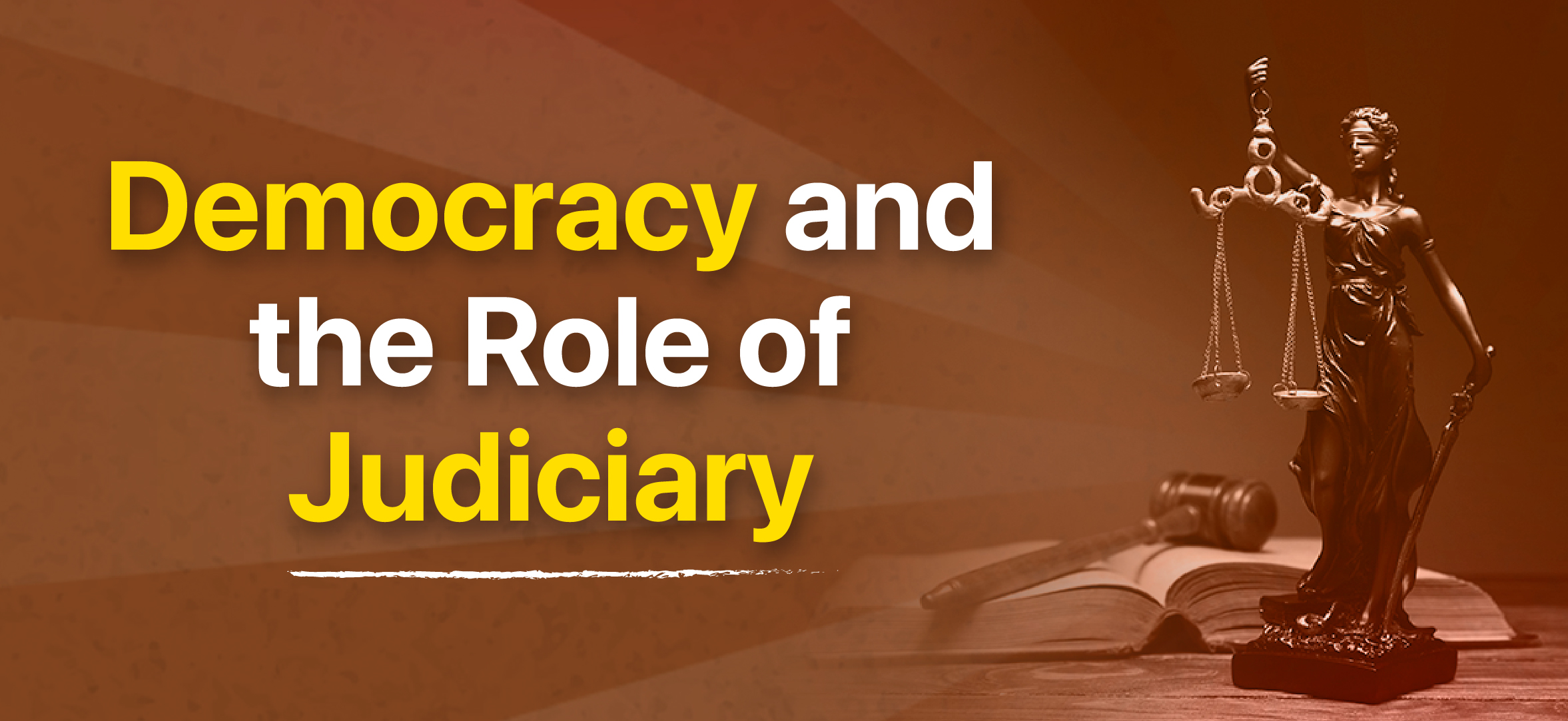DEMOCRACY AND THE ROLE OF JUDICIARY
Blogs Home
- 09 Oct 2023

Democracy, Separation of Powers and the Judiciary
In a democracy, the Constitution reigns supreme, with the Judiciary serving as its guardian. Democracy allows people to participate in decision-making through elected representatives or direct involvement. The separation of powers divides governance into three branches: the Legislature makes laws, representing public interests; the Executive enforces laws, led by a President or Prime Minister; and the Judiciary interprets and applies laws, ensuring constitutional compliance and safeguarding rights. This separation prevents the concentration of power. In parliamentary systems like India, the Executive and Legislature are interdependent. The Judiciary acts as a vital check, upholding the Rule of Law and protecting against power abuses, ensuring a balanced democratic system.
Role of an Independent Judiciary in Democracy
India is the largest democracy in the world and any healthy democracy cannot thrive without an independent Judiciary. As a safeguard against potential violations of the Rule of Law, an independent Judiciary provides the guarantee that justice is carried out impartially. As Dr. B.B. Chawdhry writes, "Justice which is the soul of the state must be administered without fear or favour."
Various provisions have been included in the Indian Constitution to ensure an independent Judiciary. This includes the appointment of judges, salary and allowances, procedures on removal and even the power to penalise in case of violation of law.
The importance of an independent Judiciary is highlighted for various reasons. Firstly, the Judiciary serves as the first line of defence against any excessive or unauthorised power of the Executive or the Legislative branch, providing a system of checks and balances. Furthermore, the Judiciary examines and if needed, invalidates any law that violates the Indian Constitution by declaring it null & void. This prevents any centralisation of power. An impartial judicial system is essential for defending the rights of minorities & other marginalised groups in a multicultural and diversified nation like India. In addition, a strong independent Judiciary is essential to maintaining the Rule of Law. It ensures that everyone is governed by the same set of laws, irrespective of their position or power.
Judicial Review
The Judiciary has the power to review any law or executive action that it considers violating the provisions of the Constitution. This power is exercised through the process of judicial review, which is the power of the Judiciary to declare a law or executive action unconstitutional. This power of judicial review has been instrumental in shaping the Constitution of India and ensuring that the provisions of the Constitution are implemented effectively. Judicial review is adopted by the Constitution of India from the Constitution of the USA.
In India, judicial review is broad in scope and deals with a variety of issues. The Supreme Court has the power of Judicial Review in various ways, including when there is a conflict between the Centre and States, or when there is a violation of the jurisdiction exercised by the Legislature and Executive. Most importantly, the Supreme Court is the guardian of Fundamental Rights. It protects the fundamental rights of Indian citizens, through issuing various writs provided under Article 32.
Some landmark cases are as follows;
- Keshavananda Bharati vs. State of Kerala (1973)
An important turning point in Indian constitutional history was highlighted by this landmark case when the Supreme Court established the "basic structure doctrine." The Court ruled that although Parliament has the authority to amend the Constitution, it cannot change its basic structure. This historic decision outlined basic principles that serve as the cornerstone of Indian constitutionalism.
- Indira Gandhi vs. Raj Narain (1975)
In this instance, the Supreme Court rendered a significant decision that made the proclamation of an emergency in India unlawful. The Court's ruling upheld the fundamental idea that nobody- not even the Prime Minister is above the law and the Constitution.
- Maneka Gandhi vs. Union of India (1978)
By emphasising that any law denying a person their life or personal liberty must be just, fair, and reasonable, this case broadened the definition of personal liberty. It developed the idea of "procedure established by law" under Article 21, to ensure that any procedure established by law must be fair and just.
- Vishakha vs. State of Rajasthan (1997)
This significant case involved workplace sexual harassment and prompted the creation of guidelines (known as the Vishaka guidelines) to address and avoid it. Through this ruling, the Court closed a gap in the law and set the stage for legislation to deal with workplace harassment.
By invalidating Section 377 of the Indian Penal Code, which classified homosexuality as a crime and described it as ‘carnal intercourse against the order of nature’, the Supreme Court in this case decriminalised homosexuality. The ruling marked a key turning point in the acceptance of the LGBTQ+ community's rights.
Judicial Activism and PIL
Judicial Activism, born in the United States, empowers the judiciary to proactively protect citizens' rights by going beyond rigid interpretations of laws or the Constitution. It bridges legislative gaps, ensuring the safeguarding of fundamental rights when the legislature falls short. It adapts legal principles to evolving societal needs and acts as a check on executive authority, preventing overreach. This activism defends democracy, minorities, and marginalized groups while promoting equality, social justice, and good governance.
Public Interest Litigation (PIL) in India empowers citizens to address issues affecting the public at large, not just individually. The judiciary has actively used PILs to champion environmental protection, sustainable development, and wildlife preservation. It has been instrumental in upholding individual liberties, including the right to privacy, freedom of speech, and combating discrimination. Landmark judgments have also advanced education, women's rights, and decriminalized homosexuality, leading to significant social change.
Challenges
- Judicial Activism vs. Separation of Powers: Critics argue that Judicial Activism could weaken the separation of powers, leading to Judicial Overreach when the Court obstructs the legislative and executive branches.
- Backlog of Cases: The Indian judicial system faces a significant backlog of cases, delaying justice and eroding public confidence. While some reforms have been initiated, more extensive changes are needed.
- Access to Justice: Many Indians, especially disadvantaged groups, struggle to access legal services due to factors like limited legal knowledge, financial constraints, and inadequate infrastructure. To address this, efforts are needed to enhance legal literacy, provide affordable legal assistance, and make the legal system more user-friendly.
Conclusion
In conclusion, the Judiciary is a crucial component of Indian democracy and plays a far larger role than simply reading the law. It is the foundation of justice, defending personal freedoms, enforcing responsibility, and supporting the Rule of Law. However, issues still exist, including the need for better accessibility and the backlog of cases. A dynamic democracy like India must keep improving its judicial system, promoting transparency, and fortifying the systems that provide justice for all. The Court will continue to flourish as a bulwark of democracy through such initiatives, directing India toward a future of justice, equality, and the preservation of democratic ideals.
SOURCES:
Book- INDIAN CONSTITUTION AT WORK AND POLITICAL THEORY by Dr.B.B.Chawdhry
https://www.drishtiias.com/to-the-points/Paper2/important-judgements-of-independent-india
https://www.drishtiias.com/mains-practice-question/question-1555
https://www.drishtiias.com/to-the-points/Paper2/judicial-activism-restraint-overreach
Annie Pruthi

Annie Pruthi is a Master’s graduate in Political Science from Jamia Millia Islamia. She is currently working as a Research Intern at PRIDE, Lok Sabha Secretariat. She is also the co-author of the book "Will You Stay?" and the recipient of the Coimbatore Literary Awards. (2020). Her research interests include Indo-Pacific studies.
Blogs Home





